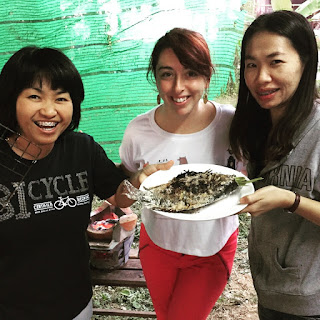Ariel Stenger is a Kentucky native and earned a BS in Economics and Asian Studies from the University of Louisville. Ariel is a 2015-2016 Fulbright-AMCHAM ETA in Chaing Rai province in northern Thailand. She brings two years of teaching experience from Teach For America in the Pine Ridge Reservation of South Dakota. Ariel's home in rural Chiang Rai allows her to connect with students and their families outside the classroom at community events like weddings, merit-making and weekly markets. After Ariel's exchange program, she will continue working for cross cultural understanding while promoting gender equality.
Neung, song, sam, see, ha, hok, jet, bet, gao, sip.
Who knew that counting from one to ten could be so critical to sports day? Imagine over 500 students organized in six color teams, packed in bleachers, on the peripheral of a grassy soccer field nested at the base of Chiang Rai’s mountains. Each student sported their team shirt color, the same style of gym pants and fixated their eyes on the lead student, orchestrating the cheer sequence with a nonverbal head nod between the student drummer, in the front. The blue team of 60 students from 12-18 years old chorused collective cheers while doing synchronized hand movements. This was sports day.
Each group is led by students who create cheers and hand movements within a theme for their color team. This year, themes ranged from Pikachu, to witches and traditional northern-Thai. Each color team organized a parade dance as well. Students nominated their princess, dedicated their lady boys in special attire and created a moving show to demonstrate their creativity and color pride as they competed for sports day awards.
 |
| The blue team sitting in solidarity preparing for their cheerleaders. |
I was catapulted into this energetic, organized and fun day on my second day in Mae Lao, a small village of about 3,000 people in northern Thailand. I walked around with my host teacher and mentor, visiting students who shared a variety of fun facts like, "I love you!" and, "I can't speak English."
 |
| Joining the student parade, the drumline and cheerleader princess show respect for Thailand and excitement. |
My intrigue for learning about Thai culture encompassed my social life, as well. My housemate and colleague, P'Pui, eagerly welcomed me to our new home. She showed me how to use the two-tub washing machine, offered me house shoes and invited me to join nightly dinners with other teachers. Two months later, I enjoy daily meals, spicy som tum (green papaya salad) and inside jokes with my new friends as we sing karaoke, plan classes and laugh as we use snap chat filters together.
 |
| Taking a selfie with a fellow teacher and supporting the Pikachu team. |
 |
| Teacher dinners include everyone in the department, from the student teachers to the department directors. |
As a teacher, I am not limited to teaching in the classroom. In fact, I am encouraged to join soccer practice, lead club activities, support other teacher projects, mentor students applying to university, volunteer at a local orphanage and share music with students after school. The role of ‘teacher’ is akin to an aunt in American culture. This generates a familial environment of support, interconnectedness and healthy honesty to understand important boundaries.
Some people say it takes a village to raise a child, but in my case, I am witnessing an entire school community work as a village. Mae Lao Wittayakom functions as a never-ending circle of mentors and mentees, both within the teachers and students.
Teachers and students look out for each other. Students offer to carry materials for the teachers regularly in exchange for encouragement, while even the slightest eyebrow raise will galvanize a student to hastily tuck in a shirt tail. Experienced teachers dote on younger teachers, mentoring and mothering them during morning assembly and lunch. When one person wins the lottery in the school office, everyone wins.
The interconnectedness at LMK includes the non-humans, too. Our school dog, Lung, has only one eye. About 10 years ago, some students found a little puppy in very poor health. They started a campaign and had fundraised among the student body to save the little puppy. Every day since, Lung has been the ‘school dog’. There's not a day that goes by when I don't see a student buying a hotdog to give to Lung, ensuring he's fed. I wasn’t surprised that everyone banded together again to cover the medical costs when he was regrettably hit by a car. With the collective prayers, extra hot dog treats and a visit to the veterinarian, Lung has recovered and is back in the business of joining English class.
 |
| At a teacher and student dinner, our school dog Lung waits patiently for the hot pot leftover. |
 |
| Sunday night "framly" dinner: when your friends become your family, you have a framly |
**Wai is a very important aspect of Thai culture. It is a way to offer respect and acknowledgement to the other person. Typically, younger students "wai" their mentors, teachers and elders.

No comments:
Post a Comment